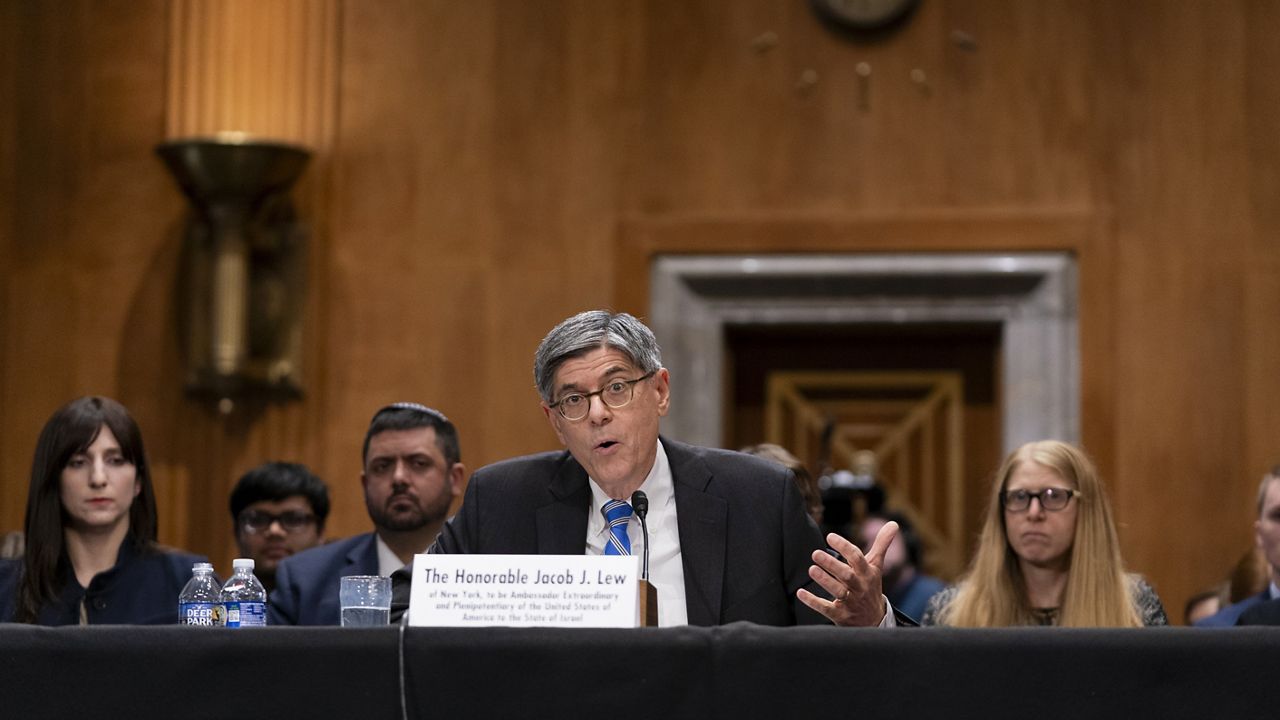Senate Democrats and Republicans agreed Wednesday that the war between Israel and Hamas has increased the urgency that the chamber confirm an ambassador to Israel. But Republicans said they have concerns about President Joe Biden’s nominee, former Treasury Secretary Jack Lew.
What You Need To Know
- Senate Democrats and Republicans agreed Wednesday that the war between Israel and Hamas has increased the urgency that the chamber confirm an ambassador to Israel
- But Republicans said they have concerns about President Joe Biden’s nominee, former Treasury Secretary Jack Lew
- Republicans pressed Lew on his role, as treasury secretary, in unfreezing Iranian assets during the Obama administration and suggested he misled the committee in testimony years ago when he said Tehran would not have access to the U.S. financial system
- Lew insisted he did not lie to Congress and that the U.S. did not welcome Iran back into its financial system
“Given the dangerous state of emergency that Israel faces, the United States needs a confirmed U.S. ambassador in Jerusalem,” Foreign Affairs Committee Chairman Ben Cardin, D-Md., said during Lew’s confirmation hearing. “We need someone there to reinforce the message that the United States stands shoulder to shoulder with the State of Israel as a response to the unprecedented terrorist attack.”
Cardin said he is asking his Senate colleagues for their cooperation in expediting a vote on Lew, which the committee has scheduled for next week.
But Republicans pressed Lew on his role, as treasury secretary, in unfreezing Iranian assets during the Obama administration and suggested he misled the committee in testimony years ago when he said Tehran would not have access to the U.S. financial system.
Israel considers Iran to be its greatest adversary. Many Republican lawmakers have said they believe Iran was behind Hamas’ attacks on Israel and have blamed Biden’s policies toward Iran. The Biden administration acknowledges Iran supports the terrorist group but has said it has seen no evidence Tehran was directly involved in the Oct. 7 assault in southern Israel that triggered the war.
Several Republicans cited a 2018 report by the GOP-led Senate Subcommittee on Investigations that found the Obama administration sidestepped sanctions and helped Iran recoup previously sanctioned oil revenue two years earlier as part of a nuclear agreement with Tehran. Lew’s Treasury Department issued a license, which was not publicly disclosed, to Bank Muscat in Oman that would allow Tehran to convert $5.7 billion in assets into euros by first converting them into U.S. dollars, according to the report.
“That is very troubling to me,” said Sen. Mitt Romney, R-Utah. “I wonder how the White House could have brought forward a nomination given that report.”
Sen. James Risch, the top Republican on the committee, accused the Obama administration of “holding hands with Iran under the table.”
Lew insisted he did not lie to Congress and that the U.S. did not welcome Iran back into its financial system.
“Returning that money was the bargain for a nuclear deal,” Lew said. “That's all we did.”
He added that Iran was so angered by the Treasury Department’s actions after the transaction — warning banks and governments against doing business with Iran — that Tehran sanctioned him.
The Democratic minority did not sign onto the Subcommittee on Investigations’ report. The top Democrat on the panel at the time, Sen. Tom Carper of Delaware, insisted in a statement then that “the Obama administration followed the law and worked to ensure the U.S. upheld our international commitments to the historic Iran deal.”
Sen. Pete Ricketts, R-Neb., said Wednesday he feared Lew would bring to the job a continuation of the Obama’s administration’s “disastrous” policies toward Iran.
Before serving as treasury secretary from 2013-17, Lew, now 68, was a White House chief of staff and deputy secretary of state under Obama. He also served twice as the director of the Office of Management and Budget under both Obama and former President Bill Clinton.
Lew told the committee that, if confirmed, he would “do my utmost to end the horrific attacks by Hamas and ensure that Israel has what it needs to defend itself.” He also said bringing home Americans who are held hostage or wrongly imprisoned would be one of his highest priorities.
“At this moment, there is no greater mission than to be asked to strengthen the ties between the United States and Israel, to work toward peace in a region that is known so much war and destruction,” Lew said.
He also vowed to continue working to promote cooperation between countries in the Middle East with the goal of achieving peace. Some have speculated that U.S.-brokered talks toward a normalization agreement between Israel and Saudi Arabia might have prompted Iran and Hamas to attack Israel.
“I will, if I'm confirmed, have to keep our eye on the strategic objectives,” Lew said. “ … If it was in the national interests of Israel and Saudi Arabia two weeks ago, it's in the interests of Israel and Saudi Arabia when this war ends.”
Democrats defended Lew. Cardin said Lew’s “experience, gravitas and political acumen makes him eminently qualified to serve as the U.S. ambassador to Israel.” Sen. Cory Booker of New Jersey said members of the Senate may not always agree with Lew’s policies but “they testify to your character.”
“To me, it’s a time that we need principled people leading in important positions,” Booker said. “It gives me great solace in this time of great despair and heartbreak that you will be stepping forward.”
The early moments of the hearing were interrupted by three separate outbursts from pro-Palestinian protesters in the gallery who shouted that a ceasefire is needed and that the U.S. should stop sending aid to Israel, which they accused of committing genocide against Palestinians.
The U.S. has not had a Senate-confirmed ambassador to Israel since Tom Nides stepped down in July. Stephanie Hallet has been leading the embassy in Jerusalem since.



